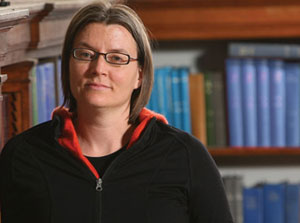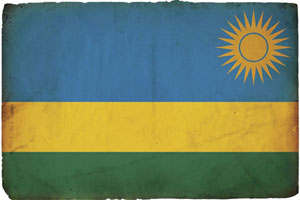 |
| Susan Thomson now works at the School of Critical Inquiry at Hampshire College in Massachusetts. She writes a blog about Rwanda. (Nick Pearce Photo) |
It’s not a phrase you often hear a newly-minted PhD utter: “I would love to be wrong.” Susan Thomson pauses. “Though that makes me a bad political scientist, because we’re supposed to predict things!”
What Susan hopes she’s wrong about is the potential for violence erupting during this August’s Rwandan presidential elections, just the second such election since the Rwandan genocide in 1994 and one that current president, Paul Kagame, is expected to win. As a doctoral candidate, Susan spent months in the country in 2006 observing what she came to view as the fiction of reconciliation in that country’s post-genocide truth and reconciliation process. Where Rwandan Patriotic Front (RPF) government officials touted the success of these programs, Susan saw the silencing of dissent and a go-along-to-get-along superficial compliance by those in the country’s underclass. And where foreign journalists reported on the successful rebuilding of urban centres – with shiny new building and airport expansions – she saw the struggles of rural peasants to stretch inadequate rations and pay exorbitant taxes. As she tried to understand the gap between public perceptions of Rwanda and the experiences being shared with her as she interviewed some 400 ordinary Rwandans, 37 of them in depth, Susan came to question the way information is managed by Rwandan government officials and academics and then disseminated through foreign journalists whose interviewing is often limited to those same elites. The irony, she says, is that in the aftermath of the 1994 Rwandan genocide, she was part of that elite.
Commanded to tell the truth
“I had that whole good-guy, bad-guy mentality,” says Susan, who successfully defended her dissertation, Resisting Reconciliation: State Power and Everyday Life in Post-Genocide Rwanda, and was awarded her PhD from Dalhousie in 2009. (It is slated for publication by the University of Wisconsin Press in 2011.) “I truly 110 per cent wanted to believe that the RPF were good.”
Originally from Nova Scotia, Susan had joined the UN in East Africa in 1992. Her time in Africa over the next decade reads like a trauma travelogue. She was posted to Somalia in the weeks before 23 Pakistani peacekeepers were killed in July 1993; she documented rape as a war crime in refugee settlements; she witnessed a roadside murder and dismemberment of a driver who had accidentally killed a child in a traffic accident in Madagascar; and was posted to Rwanda just two weeks before the 1994 genocide began. After stints in Nairobi and Western Tanzania, she returned to Rwanda in 1997 where she stayed for another three and a half years working for the US Agency for International Development and the National University of Rwanda training Rwandan lawyers in human rights law (she had completed her own law degree at University College London while with the UN). She also participated in documenting the effects of the genocide, developing a particular skill in “sniffing” mass graves. “I could look at it, sniff it, get the texture of it, and estimate how many bodies were there,” she says. “Eventually I became so accurate that they would plan the manpower and resources needed to excavate based on what I smelled.”
Many of her law students were ex-pats returning to Rwanda to help rebuild the battered country, and Susan came to admire both their commitment and their goals. Still, when she asked questions about the experiences of those outside the walls of power, they were dismissed: the peasants were illiterate and ignorant, too lazy to be trusted. They needed to be guided into reconciliation, she was told, commanded to tell the truth and forgive, and instructed in the true history of Rwanda, their job not to question but to comply.
Post Traumatic Stress Disorder
Worn down by her time on the continent, Susan returned to Canada in 2001, set to undertake her doctoral studies. “My initial project was to study narratives of democratization in Rwanda, because in my naiveté I actually believed the country was democratizing and I thought the policy of national unity reconciliation was a pillar of that project,” she says. While Susan had coped with tremendous pressure while in Africa, back home in the more relaxed rhythms of North American life, she struggled. Eventually, she was diagnosed with Post Traumatic Stress Disorder (PTSD), the result in her case not of being a victim of violence but a witness to it.
 |
| A presidential election will be held in Rwanda on 9 August 2010, the second since the Rwandan civil war. |
As she worked to understand the impact of her PTSD, her questions about those outside the walls of power continued to bubble up, and the focus of her research shifted. “If you don’t have a life-changing realization while doing doctoral work, you’re not doing it right,” she says, only half-joking. She suspected that there were gaps between the official Rwandan post-genocide policy and the lived experience of Rwandan citizens. The best way to understand those gaps, she believed, was to ask people about them. Following months of preparation and the development of an interviewing framework that would allow her to protect the identities
of those with whom she spoke, Susan returned to Rwanda in April 2006. Government officials were first welcoming – she was after all a returning supporter and scholar – then puzzled – why was she spending so much time with peasants? – then disapproving. By August, Rwandan government officials halted Susan’s research, seized her passport and compelled her to participate in an ingando “re-education” program. While their intention was to push Susan back onto the track of their accepted narrative, in fact, the process provided her with further insight into the failures of the ingando and truth and reconciliation trials (called gacaca). As she wrote later, “ingando was an alienating, oppressive and sometimes humiliating experience that worked hard to silence all forms of dissent – something that may, paradoxically, crystallize and create stronger dissent in the future.” (Getting Re-educated in Rwanda’s Solidarity Camps, in Scott Straus and Lars Waldorf, eds. Reconstructing Rwanda: State Building and Human Rights after Mass Violence. Madison: University of Wisconsin Press, forthcoming 2010). That October, without approval of the Rwandan government, she escaped the country and returned to Canada.
Speaking out
Since her return and the completion of her doctorate, Susan has continued to question the accepted narrative on post-genocide Rwanda. “The problem is that the international media doesn’t know enough [about what’s really going on in Rwanda] to push President Kagame when they’re questioning him,” she says. The result? Reports that reflect the official narrative.
Today, Susan is taking up a new post at the School of Critical Inquiry at Hampshire College in Massachusetts. She says she’ll continue to speak, write and blog (at http://democracywatch-rwanda2010.blogspot.com/) on Rwanda, though she has been vilified by those who believe she is a revisionist and supporter of Rwandan opposition forces.
“I’m not pro-opposition but I do think we should be able to hear them speak so that we can understand them,” she says.
And while speaking out herself is sometimes uncomfortable, Susan believes it is her duty, particularly after the 2009 death of her mentor and international Rwandan expert Alison Des Forges in a plane crash in Buffalo. “Is this all going to blow up in Rwanda? I hope not. But I truly believe that Rwanda is on a path to mass violence. And those who have deep knowledge of the country have to speak out.”
